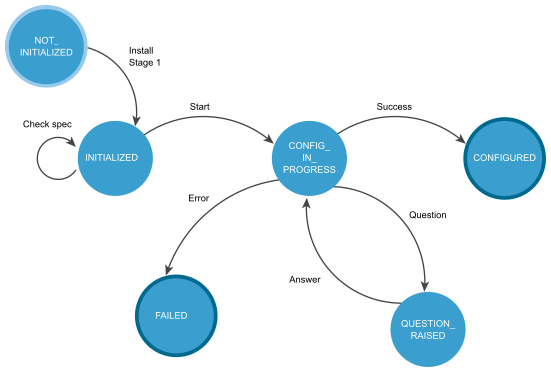You can use the
API to set up a newly deployed
vCenter Server
Appliance or
Platform Services Controller appliance.
After stage 1 of the deployment
process completes successfully, the appliance enters in an
INITIALIZED state. If
the appliance is not initialized, you cannot run stage 2 of the deployment
process. You can get the state of the appliance by using the
vcenter
deployment service. The appliance can enter six states during the
deployment process.
Install Stage 2 State
Diagram

Appliance States During
Install Stage 2
|
|
|
NOT_INITIALIZED
|
The install stage 1 phase is in progress, not
started, or failed.
|
|
INITIALIZED
|
The appliance is deployed and ready for setup.
|
|
CONFIG_IN_PROGRESS
|
The setup process is in progress.
|
|
QUESTION_RAISED
|
You must answer the question to continue the
setup process. The appliance stays in the
QUESTION_RAISED state
until it receives the correct answer.
|
|
FAILED
|
Errors occurred during the setup process. You
can check the errors, warnings, and info data structures.
|
|
CONFIGURED
|
The appliance is installed and configured
successfully.
|
FAILED and
CONFIGURED are final
states.
User Operations
lists operations that you can perform to set up your newly deployed appliance.
User Operations
|
|
|
Get deployment information
|
You can retrieve information about the current
deployment status. This operation is useful both before initiating stage 2 of
the deployment and for monitoring the progress of the setup process.
|
|
Validate the configuration document
|
You can optionally verify whether your install
spec is valid before starting the setup process.
|
|
Configure the appliance
|
You can initiate the setup process by providing
an install spec that defines the values for the settings that you want to
configure.
|
|
Get question
|
You can retrieve a question raised during the
setup process.
|
|
Answer question
|
You can provide an answer to the question
raised during the setup process. The available answer values are
YES,
NO,
OK,
CANCEL,
ABORT,
RETRY, and
IGNORE. The possible
answer values depend on the type of the question.
Note
Each question has
a default answer value. If you set questions to receive automatic answers in
the install spec and a question is raised during the setup process, the default
answer value is automatically provided as the answer to the question.
|
For information about the HTTP
requests that you can use to perform the user operations, see
HTTP Requests for Install Stage 2.
